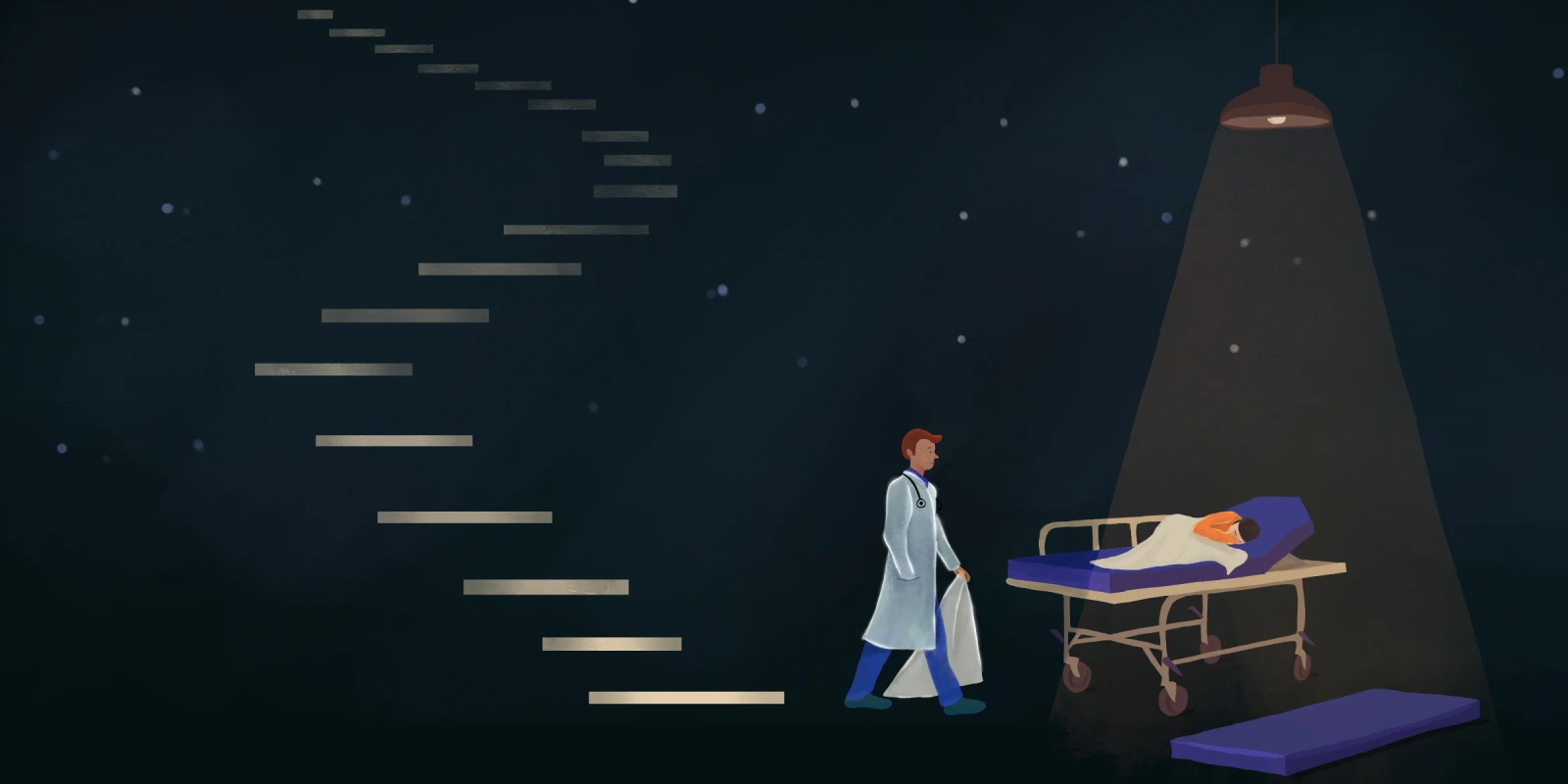Empathy eludes me between midnight and dawn. I find the 3:00 hour uniquely cruel, numbers not meant to be seen by men like me. Too early to have logged enough sleep to “play-through” tomorrow. Too late to hope for enough sleep on the other side of whatever nonsense just walked through the door.
In this case, said nonsense was a 43-year-old man whose chief complaint was bilateral ankle pain. I thought to order an X-ray from this side of slumber, steal more time from the falling sand. But the nurse balked. Her words careful, her wisdom true.
“He says the pain is from the blisters, where the shackles rubbed his skin.”
“You mean handcuffs?” I heard my own voice echoing back.
“Yes, but for the feet.”
At this hour, so much space stretches between each thought.
“You mean police?”
“Yes, but he’s no longer in custody. Said he was walking from the airport tonight when the wounds started to hurt.”
It had already been a hard shift. Not because the patients were complex. But because the state was being inundated by a storm of Biblical proportions, 3 inches of rain per hour, a blizzard atop Mauna Loa and Mauna Kea on the Big Island, rainfall so extreme here as to cut Molokai into pieces where the rivers swelled in two places and the mountain had released a chunk of itself in another. As such, I’d lost the ambulance and, with it, the airport. A heart attack was waiting in bed 2. A stroke in bed 1. An 80-year-old woman with a negative knee X-ray but no ride home in bed 4. In bed 6, an elderly man who had eaten an entire marijuana cookie was still asleep. They all should have been transferred or gone home by now. But instead, they were stuck. We all were. Erosion is more visceral in the middle of the Pacific. In both the island and the tolerance of man.
Just past midnight, I was finally allowed the luxury most take for granted: to lie down and wait for sleep.
That’s when the phone rang. The night with all that blackness. The cobwebs of exhaustion and melatonin. The shadow world without cortisol’s light. 3:19. Any reason that might once have rationalized this chosen career and this life had washed away, like the mountain, beneath the weight of all the extremes.
Slippery and elusive, empathy. I’ve come to appreciate its prerequisite is compassion. And right before that, love for my fellow man.
The lights of the corridor like crochet needles, blunt but stabbing just the same. I press the side button on my phone and it blinks too quickly awake. 3:22. Beneath the numbers, the date. January 18. Another stabbing, this less dull. It was my daughter’s birthday yesterday. Another notch in the belt of being a crappy father. Sometimes I can see my failures in real time.
The nurses’ station only 15 paces from my call room door.
“He says he wants a sandwich,” the nurse says.
“No sandwich,” I blurted. “We’re not Taco Bell.”
The nurse laughed.
“Is the airport open?” I asked.
“He didn’t fly in. Said he just started there.”
Her words made no sense. I was thinking about the heart attack, or even the stroke, whether the Air Ambulance crew got in, perhaps some patient had flown out. Then I realized she thought I was asking about the patient with the shackles, the 42-year-old who had told her he’d walked from the airport, who came in at 3:19.
I reached for it. That handhold of empathy. That slippery skin that holds compassion. That subtle blue dwindling at the heart of the fire that kindles love. But sometimes it’s hard to love an addict. The compassion seems to slip away when the disease is brought on, at least in part, by themselves.
I walked past the nurses’ station and into the exam room. He had a name, Billy. He had no shirt. In its place, his skin like a canvas of bad choices in indelible ink. A naked woman with a name he’d crossed out. God is Savior across his neck in jailhouse script 6 inches tall. Letters across his knuckles of four-letter words. Sagging pants with no belt. Black high-top boots. Rain-drenched socks. They hung heavy like molten time.
Out of habit, my eyes were already searching. They focused on the terminal ends of his pant cuffs, at the skin just above the horizon of where the socks sagged. They were looking for the wounds. The ones the cops’ shackles had made. Before our first words, I was looking for a way to send him home.
And that’s why I didn’t see him. I was looking for a way back to sleep. I wasn’t interested in the man, much less the love that feeds compassion.
I spoke to him through sleep’s cobwebs, leaning against the sink, careful not to move too close. I listened as his lips moved. Tales of his 15 mile walk from the airport to the west all the way to Kahala to the east and then, illogically, back here. Tales of the rain and the thigh-high rivers he’d forded with a stick. Tales of the shackles from the night before and where they rubbed blisters into his skin. Tales of the same police at the barricade where the island couldn’t even hold on and sent the hillside down.
“So I threw my phone in the bushes. That’s when I turned around, came up here.”
And then I had him. A break in his logic. It wasn’t the phone he’d thrown in the bushes. It was batu, meth. It was the only logic that answered all the whys.
“That explains the scratches,” I said, watching his face for a tell.
“I was looking for it for hours,” he said, “in the dark with no light.”
And then I played my card. “It wasn’t your phone, was it?”
And then Billy looked up. That’s the first time I saw him. And that’s the first time he saw me. And I’m not sure what he saw. But something turned to trust. And then, every secret spilled right out.
I pulled up a stool and moved closer. I’d seen enough of his injuries. All there was to do was to listen, to wait. And then, after he’d spilled what he must, I could send him home. As long as I stayed quiet. But so too, a curiosity… like the end of a thread that wants to be pulled.
He was a longshoreman before he got hooked. Had a silver Tacoma, a house with a wrap-around deck, a union job, a wife he said was beautiful. Loved to fish. Throw net. Hunt. And then something shifted. As if a wrinkle in his story opened up and claimed him. Like the ocean swallows men.
“Aolani Lulua’ina Kealoha Ku’u Maka,” he chanted, over and over, as if in ceremony. The meniscus of a tear crested his lower eyelid. It was the name of his daughter. The thought of her now reminding him of every pain, every mistake.
He said it again and again. Not the patient who had stolen me from my sleep. But the man whose heart beat no differently than mine. The man whose bones dripped with the same regret as mine. The man who only wanted to go back, to make things right.
I pressed the button on my phone to check the time. 3:33. January 18. My daughter’s own name on my lips, but silent. Cassidy Jo. Again and again. Like raindrops that fall. Every mistake. Each regret. It was as good an hour as any to see the light.
There was never a choice. Not for him. Not for me. His intention was never to wake me up, to ruin my night. No more than it was his choice to lose his wife, his lifted Tacoma, his wraparound deck, his daughter whose name filled this room. Just as I had never chosen to miss her birthday. It’s just what we do. The roles that find us, the roles we fill. He needed his batu just like I needed whatever it is this job provides me.
I felt a guilt rising up. How narcissistic to presume I had any part in it. This man’s night. This man that was here for help.
Sometimes I see clearly the humor of this life, the hubris of this illusion we call control. Sometimes I recognize that we’re all the same, you and me, the addict and our kids. Just like the chunks of stone that the mountain once held, the boulders in the highways, the ones flashing in red and blue. It’s not our doing so much as the world around us when the Earth crumbles away and lets go, when we find something or someone that blocks our paths.
We are not so different, after all. We all make our choices. And we tremble the same when we’re stuck in the cold rain. It was his soul that shone through. Like an arc of lightning, it bound us. And lit the path to empathy with its brilliant light. Our hearts connected, his soul linked with mine.
Turns out his chief complaint wasn’t ankle pain. It wasn’t blisters. And it wasn’t ulcers from his shackles the cops had put him in the night before. This man had a broken heart and a spirit that could bear no more. His cure was connection. And he never chose this disease. No more so than this floating rock of dirt and lava chose this rain.
I gave Billy some mupirocin and a course of trimethoprim. And, in time, I’d convinced him that it was the batu that had robbed him of so much.
“You think I can have a sandwich?” Billy asked.
I clicked the button on my phone. 4:17.
The 3:00 hour had passed. And so with it, all the blame.
When has your empathy failed you? Share in the comments.
Steve Rogoff, MD is a rural family practice, emergency, and functional medicine physician who lives in Hawaii. His interests include surfing, music, and playing with words. His writing can be found at www.steverogoff.com. Steve is a 2021–2022 Doximity Op-Med Fellow.
All names and identifying information have been modified to protect patient privacy.
Illustration by Yi-Min Chun






